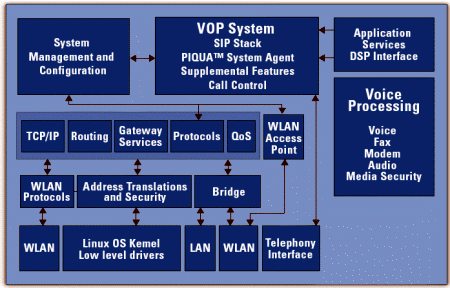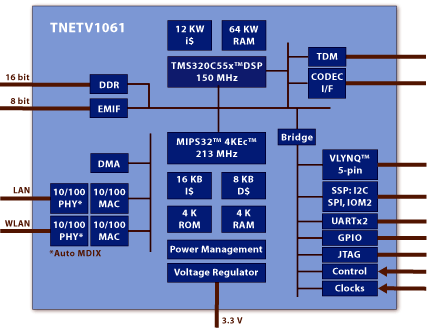Next-gen TI VoIP SoC runs Linux
Mar 7, 2006 — by LinuxDevices Staff — from the LinuxDevices Archive — 26 viewsTexas Instruments (TI) plans to ship an SoC (system-on-chip) for VoIP (voice-over-IP) applications in Q2-06. The TNETV1061 runs Linux on a 213MHz MIPS32 core, and also has a 150MHz DSP (digital signal processor) core. It targets residential VoIP applications, including CPE gateways (customer premises equipment), VoIP gateways, and terminal adapters.
TI says the TNETV1061 represents a “significant improvement” in performance over its previous VoIP designs. The new chip can simultaneously handle four voice channels, or two secure voice channels, it says. It will be available with a Linux-based operating system, and TI's “Telogy” software stack, said to offer conference bridging and other advanced features.

Typical residential gateway design
(Click to enlarge)
Potential applications include analog terminal adapters that interface normal phones with VoIP systems, VoIP gateway/routers, VoIP-enabled 802.11b/g access point/routers, and broadband cordless phones, according to TI.
Additionally, the new VoIP chip will support “higher rate codecs,” including EVRC and GSM, allowing it to be used in CPE for fixed-mobile convergence applications, TI says.
Another application-specific embedded processor supplier, PMC-Sierra, also offers a MIPS 4KEc-based SoC positioned as a “router-on-a-chip” for VoIP applications.
Features
The TNETV1061 is based on a MIPS32 4KEc core clocked at 213MHz. It also integrates a TI TMS320C55x DSP core, clocked at 150MHz.

TI TNETV1061 architecture diagram
Touted hardware features of the TNETV1061 VoIP SoC include:
- DDR memory interface
- NAND Flash memory interface for local voicemail storage
- Supports SLIC (subscriber-line interfaces)
- Supports telephony interfaces from Legerity and Silicon Laboratories
- 10/100 Ethernet PHY supporting AutoMDIX
- VLYNQ interface to TI's TNETW1350A 802.11b/g WLAN solution
Touted software features include:
- Linux OS
- Wide vocoder support, including G.711 (PCM), G.723.1A, G.726(ADPCM), G.729AB, GSM-FR, GSM-AMR
- Uses TI's PIQUA, said to reduce the effects of jitter and/or packet loss
- Line echo cancellation: G.168-2002
- SIP protocol stack and supplemental services
- Secure RTP and SIP TLS
- T.38 Fax Relay: T.30, V.17,V.29, V.27ter, V.21
- V.34 Fax Support
- Caller ID
- Foreign voltage telephony line test
- Wi-Fi certified 802.11b/g access point
Additionally, the new VoIP chip will support TI's suite of voice and network management and configuration tools, it says.
TI's executive director of CPE, Fred Zimmerman, stated, “The TNETV1061 provides the additional processing power for emerging voice and data routing requirements while meeting the ever-present economical price pressures.”
In-Stat Analyst Joyce Putscher stated, “The broadband CPE market grew by 20 percent worldwide last year, in large part due to residential devices [that] deliver more advanced services.”
Availability
The TNETV1061 will reach volume production in 2Q-06, TI says. Meanwhile, TI offers a development kit for the chip that supports several telephony adapters.
This article was originally published on LinuxDevices.com and has been donated to the open source community by QuinStreet Inc. Please visit LinuxToday.com for up-to-date news and articles about Linux and open source.